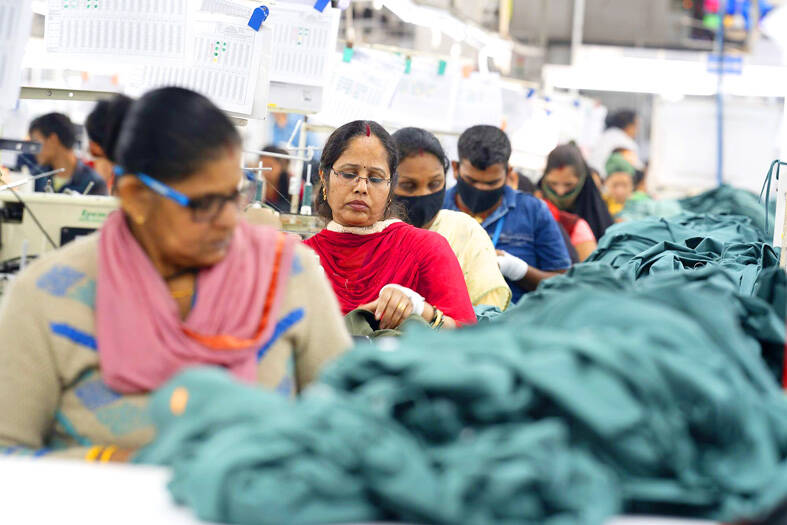India aims to attract at least US$100 billion a year in gross foreign direct investment (FDI), a top official said, as the South Asian nation courts investors looking to diversify away from China.
“Our target is that we will average at least US$100 billion over the next five years. The trend is very positive and upward,” Indian Department for Promotion of Industry and Internal Trade Secretary Rajesh Kumar Singh said in an interview in New Delhi on Thursday.
The ambitious target compares with an annual average of more than US$70 billion in FDI in the five years through March last year, and would be a reversal in trend after last year’s decline.

Photo: Bloomberg
The figure for the current fiscal year would be “closer to” the US$100 billion target, Singh said.
The world’s fastest-growing major economy is appealing to businesses that want to hedge against geopolitical tensions by spreading their operations more broadly — sometimes called a “China plus one” strategy.
Companies such as Apple Inc and Samsung Electronics Co have boosted manufacturing in India, taking advantage of incentives offered by Indian Prime Minister Narendra Modi’s government.
Still, foreign investment has not matched the pickup in local manufacturing.
Singh attributed that to higher inflation and interest rates in developed nations, as well as geopolitical conflicts and risk perception about emerging markets.
India has “unmatched market growth opportunity in a variety of sectors such as electric vehicles, electronic goods or general consumer goods, where penetration levels in our population are far lower than the global average,” he said.
Singh vowed that the government would take more steps to ease FDI rules.
Boosting the share of manufacturing in India’s economy has been one of the key promises made by Modi, who is seeking a third term in elections that start on April 19.
The government’s production-linked incentive program has already helped boost manufacturing and reduce India’s dependence on imports for products such as telecommunications and auto components, Singh said.
He cited export growth that has been driven by new industries.
“We have at least 39 new medical devices being made in India that were never made,” he said.
The administration has plans for several new industrial corridors that would likely get approval within the first 100 days of a new government, Singh said.
He acknowledged that the incentive plan has made slow progress in the steel and textile industries, and cited plans to expand the list of items covered under it.
The government is also working to address delays in granting visas to Chinese vendors and professionals who are needed to install machinery, an issue that has been raised by businesses, Singh said.
“Short-term visas should be provided to Chinese technicians, as we are trying to boost our own manufacturing,” he said.

MULTIFACETED: A task force has analyzed possible scenarios and created responses to assist domestic industries in dealing with US tariffs, the economics minister said The Executive Yuan is tomorrow to announce countermeasures to US President Donald Trump’s planned reciprocal tariffs, although the details of the plan would not be made public until Monday next week, Minister of Economic Affairs J.W. Kuo (郭智輝) said yesterday. The Cabinet established an economic and trade task force in November last year to deal with US trade and tariff related issues, Kuo told reporters outside the legislature in Taipei. The task force has been analyzing and evaluating all kinds of scenarios to identify suitable responses and determine how best to assist domestic industries in managing the effects of Trump’s tariffs, he

TIGHT-LIPPED: UMC said it had no merger plans at the moment, after Nikkei Asia reported that the firm and GlobalFoundries were considering restarting merger talks United Microelectronics Corp (UMC, 聯電), the world’s No. 4 contract chipmaker, yesterday launched a new US$5 billion 12-inch chip factory in Singapore as part of its latest effort to diversify its manufacturing footprint amid growing geopolitical risks. The new factory, adjacent to UMC’s existing Singapore fab in the Pasir Res Wafer Fab Park, is scheduled to enter volume production next year, utilizing mature 22-nanometer and 28-nanometer process technologies, UMC said in a statement. The company plans to invest US$5 billion during the first phase of the new fab, which would have an installed capacity of 30,000 12-inch wafers per month, it said. The

‘SWASTICAR’: Tesla CEO Elon Musk’s close association with Donald Trump has prompted opponents to brand him a ‘Nazi’ and resulted in a dramatic drop in sales Demonstrators descended on Tesla Inc dealerships across the US, and in Europe and Canada on Saturday to protest company chief Elon Musk, who has amassed extraordinary power as a top adviser to US President Donald Trump. Waving signs with messages such as “Musk is stealing our money” and “Reclaim our country,” the protests largely took place peacefully following fiery episodes of vandalism on Tesla vehicles, dealerships and other facilities in recent weeks that US officials have denounced as terrorism. Hundreds rallied on Saturday outside the Tesla dealership in Manhattan. Some blasted Musk, the world’s richest man, while others demanded the shuttering of his

Taiwan’s official purchasing managers’ index (PMI) last month rose 0.2 percentage points to 54.2, in a second consecutive month of expansion, thanks to front-loading demand intended to avoid potential US tariff hikes, the Chung-Hua Institution for Economic Research (CIER, 中華經濟研究院) said yesterday. While short-term demand appeared robust, uncertainties rose due to US President Donald Trump’s unpredictable trade policy, CIER president Lien Hsien-ming (連賢明) told a news conference in Taipei. Taiwan’s economy this year would be characterized by high-level fluctuations and the volatility would be wilder than most expect, Lien said Demand for electronics, particularly semiconductors, continues to benefit from US technology giants’ effort